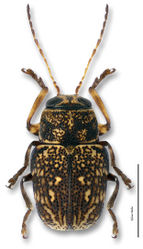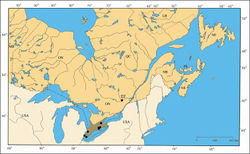Pachybrachis atomarius
| Notice: | This page is derived from the original publication listed below, whose author(s) should always be credited. Further contributors may edit and improve the content of this page and, consequently, need to be credited as well (see page history). Any assessment of factual correctness requires a careful review of the original article as well as of subsequent contributions.
If you are uncertain whether your planned contribution is correct or not, we suggest that you use the associated discussion page instead of editing the page directly. This page should be cited as follows (rationale):
Citation formats to copy and paste
BibTeX: @article{Barney2013ZooKeys332, RIS/ Endnote: TY - JOUR Wikipedia/ Citizendium: <ref name="Barney2013ZooKeys332">{{Citation See also the citation download page at the journal. |
Ordo: Coleoptera
Familia: Chrysomelidae
Genus: Pachybrachis
Name
Pachybrachis atomarius (F. E. Melsheimer, 1847) – Wikispecies link – Pensoft Profile
- Cryptocephalus atomarius F. E. Melsheimer, 1847: 170.
- Pachybrachis infaustus Haldeman, 1849: 262.
- Pachybrachys atomus Bowditch, 1909: 319.
Recognition
Body largely fuscous, dull, mottled with many yellow spots (Habitus 1); elytral puncturation dense, confused discally, more or less arranged in rows towards rear and sides; face of males predominately yellow; pygidium entirely black, convex (Figure 8d); male size small: length 1.85 ± 0.07 mm, width 1.01 ± 0.03 mm.
Distribution
The distribution in eastern Canada is restricted in southern Ontario to remnants of the Carolinian forest (Johnson 2012[1]; Shelford 1963[2]). In Québec, the distribution is isolated from the main distribution area (Map 1). The unique specimen available was probably collected on the Eardley Escarpment, which is a warmer refugium created by cliffs of the Laurentian Highlands oriented southwards (Brunton and Lafontaine 1971[3]).
Material examined
ONTARIO: Essex Co., Ojibway, 7.VIII.1943, S. D. Hicks [6♀, CNC]; same data, except 8.VII.1943, S. D. Hicks [1♀, CNC]; Point Pelee, 9.VII.1931, W. J. Brown [5♂ 1♀, CNC]; Roseland, 24.VI.1944, S. D. Hicks [1♂, CNC]; Lambton Co., Walpole Island [1♂ 1♀, CNC]; Norfolk Co., Normandale, 4.VI.1931, W. J. Brown [1♂ 1♀, CNC]; Turkey Point, 8.VII.1931, W. J. Brown [1♂ 4♀, CNC]; Walsh, 10.VI.1931, W. J. Brown [1♀, CNC]; Ontario Co., Fisher Glen, 12.VI.1931, W. J. Brown [2♂ 6♀, CNC].
QUÉBEC: Pontiac Co., Old Chelsea, 12.VII.1961, J. R. Vockeroth [1♂, CNC].
Host plants
No plant association records were available from specimens examined, and Barney et al. (2011)[4] did not report any either. Clark et al. (2004)[5] presents the known literature, but since adults were usually swept from vegetation, these records cannot automatically be interpreted as real host associations.
Comments
Pachybrachis atomarius is one of Fall’s (1915)[6] Group C species that have “great variation in the degree of (elytral) maculation.” In spite of the extremely variable elytral mottling, ranging from heavily speckled with yellow to almost entirely black, Pachybrachis atomarius males are relatively easy to identify by the combination of the predominately yellow face (Figure 1c) and entirely black, convex pygidium (Figure 8d). The entirely black, convex pygidium character also permits identification of singleton females.
Although Pachybrachis atomarius is a typical eastern North American species distributed from Manitoba to Oklahoma to Atlantic states (Riley et al. 2003[7]; LeSage 1991[8]; Barney, unpublished data), in Ontario it is restricted to the Carolinian Zone in the southernmost part of the province. Its presence in Québec is considerably disjunct from its main distribution area, and this isolation is due to the warmer microhabitat of the Laurentian Highlands cliffs of Eardley Escarpment, which are fully exposed southwards and harbor similarly disjunct insects and plants (Hall 1991[9]; Layberry et al. 1998[10]; NCC 2011a[11]).
Since Pachybrachis atomarius has not been collected in eastern Canada over the last 50 years, it is likely extirpated from the eastern Canadian fauna.
Taxon Treatment
- Barney, R; LeSage, L; Savard, K; 2013: Pachybrachis (Coleoptera, Chrysomelidae, Cryptocephalinae) of Eastern Canada ZooKeys, 332: 95-175. doi
Other References
- ↑ Johnson L (2012) Endangered ecosystems: Carolinian Zone. On Nature. http://onnaturemagazine.com/endangered-ecosystem-carolinian-zone.html [accessed 14 March 2012]
- ↑ Shelford V (1963) The ecology of North America. University of Illinois Press, Urbana, Illinois, 610 pp.
- ↑ Brunton D, Lafontaine J (1971) An unusual escarpment flora in western Quebec. The Canadian Field-Naturalist 88(3): 337-344.
- ↑ Barney R, Hall S (2011) New host plant records for selected Cryptocephaline leaf beetles (Coleoptera: Chrysomelidae) in Kentucky. The Coleopterists Bulletin 65(1): 15-19. doi: 10.1649/0010-065X-65.1.15
- ↑ Clark S, LeDoux D, Seeno T, Riley E, Gilbert A, Sullivan J (2004) Host plants of leaf beetle species occurring in the United States and Canada. The Coleopterists Society, Special Publication No. 2, 476 pp.
- ↑ Fall H (1915) A revision of the North American species of Pachybrachys. Transactions of the American Entomological Society 41: 291-486.
- ↑ Riley E, Clark S, Seeno T (2003) Catalog of the leaf beetles of America north of Mexico (Coleoptera: Megalopodidae, Orsodacnidae and Chrysomelidae, excluding Bruchinae). Coleopterists Society, Special Publication no. 1, 290 pp.
- ↑ LeSage L (1991) Family Chrysomelidae leaf beetles. In: Bousquet Y (Ed) Checklist of beetles of Canada and Alaska. Research Branch, Agriculutre Canada. Publication 1861/E., Ottawa, 301–323.
- ↑ Hall P (1991) A surprise hairstreak summer. Trail and Landscape 25(2): 37-39.
- ↑ Layberry R, Hall P, Lafontaine J (1998) The Butterflies of Canada. University of Toronto Press, Toronto, 280 pp.
- ↑ NCC ( (2011a) The eastern red cedar: an endangered tree protected in Gatineau Park. Capitale, Eardley Escarpment. http://www.canadascapital.gc.ca/sites/default/files/pubs/Eastern-Red-Cedar-Endangered-Tree-Protected-Gatineau-Park.pdf [accessed 14 March 2012]
Images
|

